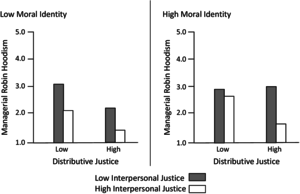When Managers Become Robin Hoods: A Mixed Method Investigation
2022
Article
ld
When subordinates have suffered an unfairness, managers sometimes try to compensate them by allocating something extra that belongs to the organization. These reactions, which we label as managerial Robin Hood behaviors, are undertaken without the consent of senior leadership. In four studies, we present and test a theory of managerial Robin Hoodism. In study 1, we found that managers themselves reported engaging in Robin Hoodism for various reasons, including a moral concern with restoring justice. Study 2 results suggested that managerial Robin Hoodism is more likely to occur when the justice violations involve distributive and interpersonal justice rather than procedural justice violations. In studies 3 and 4, when moral identity (trait or primed) was low, both distributive and interpersonal justice violations showed similar relationships to managerial Robin Hoodism. However, when moral identity was high, interpersonal justice violations showed a strong relationship to managerial Robin Hoodism regardless of the level of distributive justice.
| Author(s): | Cropanzano, Russell and Skarlicki, Daniel P. and Nadisic, Thierry and Fortin, Marion and Van Wagoner, Phoenix and Keplinger, Ksenia |
| Journal: | Business Ethics Quarterly |
| Volume: | 32 |
| Number (issue): | 2 |
| Pages: | 209--242 |
| Year: | 2022 |
| Publisher: | Cambridge University Press |
| Department(s): | Organizational Leadership and Diversity |
| Research Project(s): |
When Managers Become Robin Hoods: A Mixed Method Investigation
|
| Bibtex Type: | Article (article) |
| Paper Type: | Journal |
| DOI: | 10.1017/beq.2021.16 |
| State: | Published |
|
BibTex @article{cropanzano_skarlicki_nadisic_fortin_van,
title = {When Managers Become Robin Hoods: A Mixed Method Investigation},
author = {Cropanzano, Russell and Skarlicki, Daniel P. and Nadisic, Thierry and Fortin, Marion and Van Wagoner, Phoenix and Keplinger, Ksenia},
journal = {Business Ethics Quarterly},
volume = {32},
number = {2},
pages = {209--242 },
publisher = {Cambridge University Press},
year = {2022},
doi = {10.1017/beq.2021.16}
}
|
|


